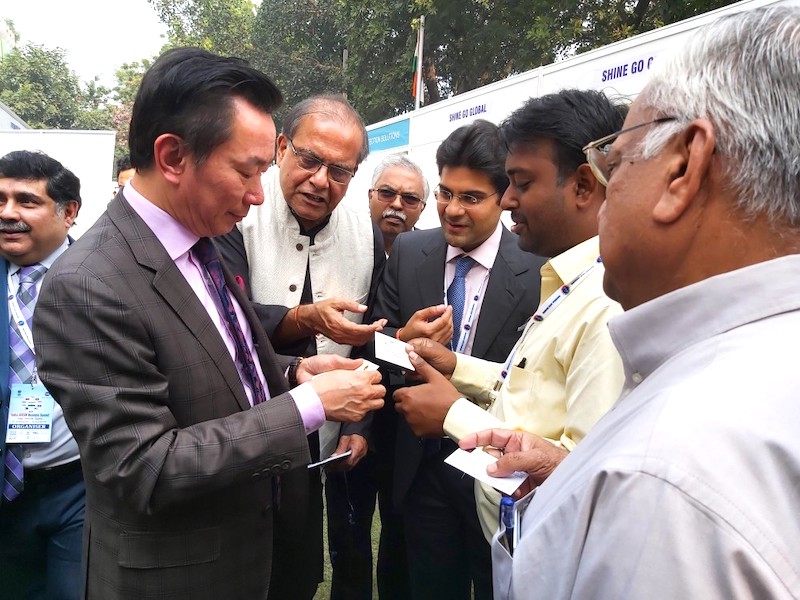Vietnam is among top expansion destinations for Indian companies
Vietnam seen as is a fast-growing economy that offers a sizeable domestic market, with a well-educated, tech-savvy, and cost-competitive labor force.
Vietnam is among the top expansion destinations for Indian companies who, with an ASEAN focus, are highly optimistic about business growth in the region.
| Vietnamese Ambassador to India Pham Sanh Chau and Indian enterprises at a promotion conference. Photo: the Vietnam Embassy in India. |
All surveyed Indian companies expected their business to expand in ASEAN, including Vietnam, Indonesia, Malaysia and Singapore while more than 90% of the projected growth in revenue (93%) over the next 12 months.
This is the result of the latest survey commissioned by Standard Chartered for its “Borderless Business: India-ASEAN Corridor”, a strategic report that explores high-potential opportunities for cross-border growth in this corridor. This is the sixth edition of the Borderless Business series.
Michele Wee, CEO of Standard Chartered Bank Vietnam said Vietnam is a fast-growing economy that offers a sizeable domestic market, young, well-educated, tech-savvy and cost-competitive labor force, advantages of being a member of multiple free trade agreements and a strategic location. The country is also a key link in the global supply chain.
“We believe that Vietnam continues to offer appealing business and investment opportunities for foreign businesses and investors. Levering our deep local knowledge, drawing our 118 years of history in Vietnam, combined with our unrivalled international expertise, Standard Chartered is committed to supporting our clients in Vietnam and overseas in doing cross-border business and realizing their growth ambitions,” she added.
Access to the large and growing ASEAN consumer market (90%), availability of an abundant and skilled workforce (51%) and access to a global market enabled by a network of Free Trade Agreements (44%) are regarded as the most important drivers for expansion into the region by senior executives of the surveyed Indian companies.
The Regional Comprehensive Economic Partnership (RCEP) is also expected to attract more investments into the 10-nation bloc. Some 63% of respondents indicated that their company will increase investments into ASEAN over the next 3-5 years, on the back of the ratification of the RCEP agreement.
Risks and challenges
Despite the opportunities, the survey also showed a wide range of risks identified by Indian companies in the region. The top three risks are the Covid-19 pandemic or other health crises (85%), the slow revival of the economy and drop in consumer spending (73%), as well as geopolitical uncertainty and trade conflicts (54%).
In addition, more than 60% of the respondents agreed that the most significant challenges in the next 6 to12 months are adapting their business model to industry practices and conditions within ASEAN, understanding regional regulations, payment methods, and infrastructure, as well as building relationships with suppliers and adapting supply chain logistics.
To mitigate these risks and challenges and drive resilient and rebalanced growth in ASEAN, the survey respondents considered entering new partnerships / joint ventures to increase market presence (73%), investing in leadership and talent development (59%) and driving sustainability and ESG (Environment, Social and Governance) initiatives (41%) as the most important areas for their companies to focus on.
To support their growth, these companies said they are seeking banking partners with one-stop corporate financing and capital raising services (59%), digital platforms for foreign exchange, and transaction banking (54%) and foreign exchange hedging and comprehensive multi-currency settlement services (46%).
Gaurav Bhatnagar, Head of Trade and Working Capital, India and South Asia at Standard Chartered, said: “ASEAN is one of India’s largest trading partners. With its ‘Act East’ Policy, India aims to enhance trade and commerce with its eastern neighbors, positioning the ASEAN region as an important player to deliver future growth aspirations for the nation.”
Standard Chartered is committed to delivering sustainable trade finance solutions to its clients – whose number is expected to grow rapidly on the back of a strong Government impetus and a perceptible shift in consumer demand in favor of clean technology, he added. Sectors like IT services, trading, pharmaceuticals, automobile (particularly electric vehicles) and renewable energy offer significant export opportunities to Indian firms.











